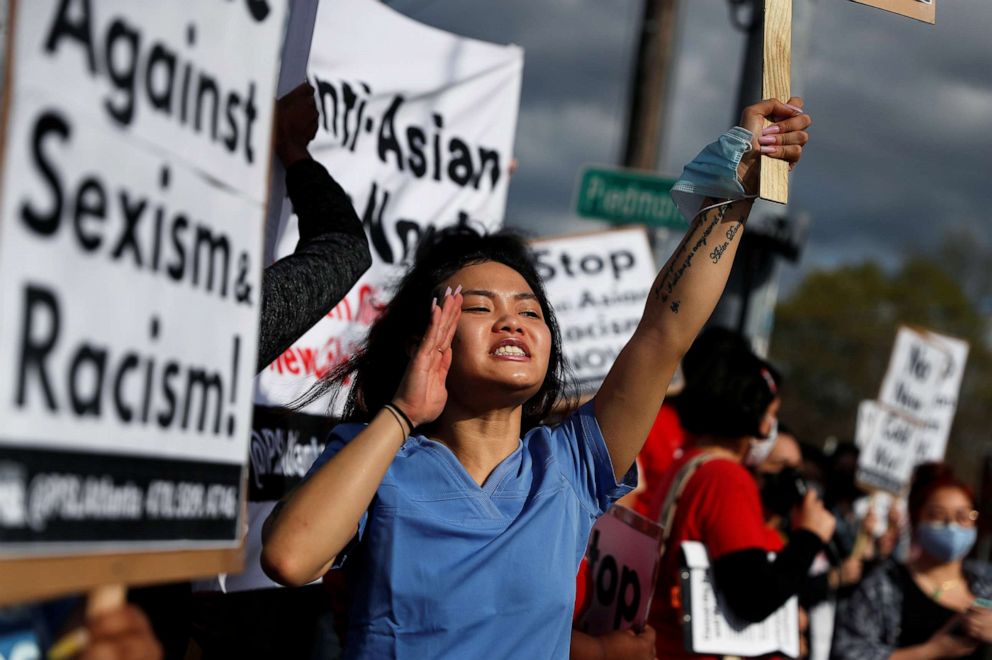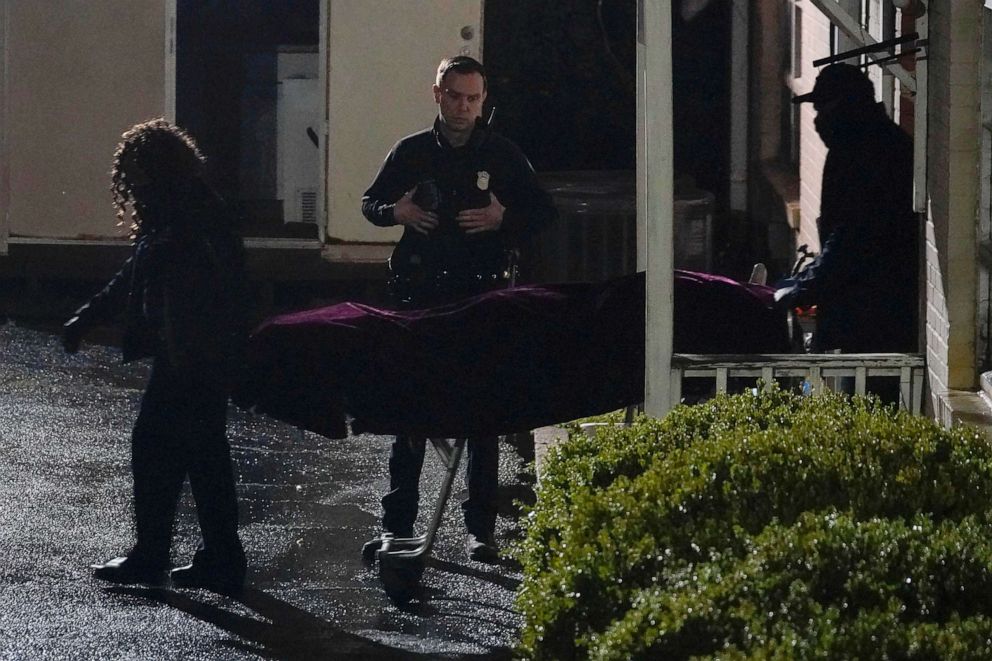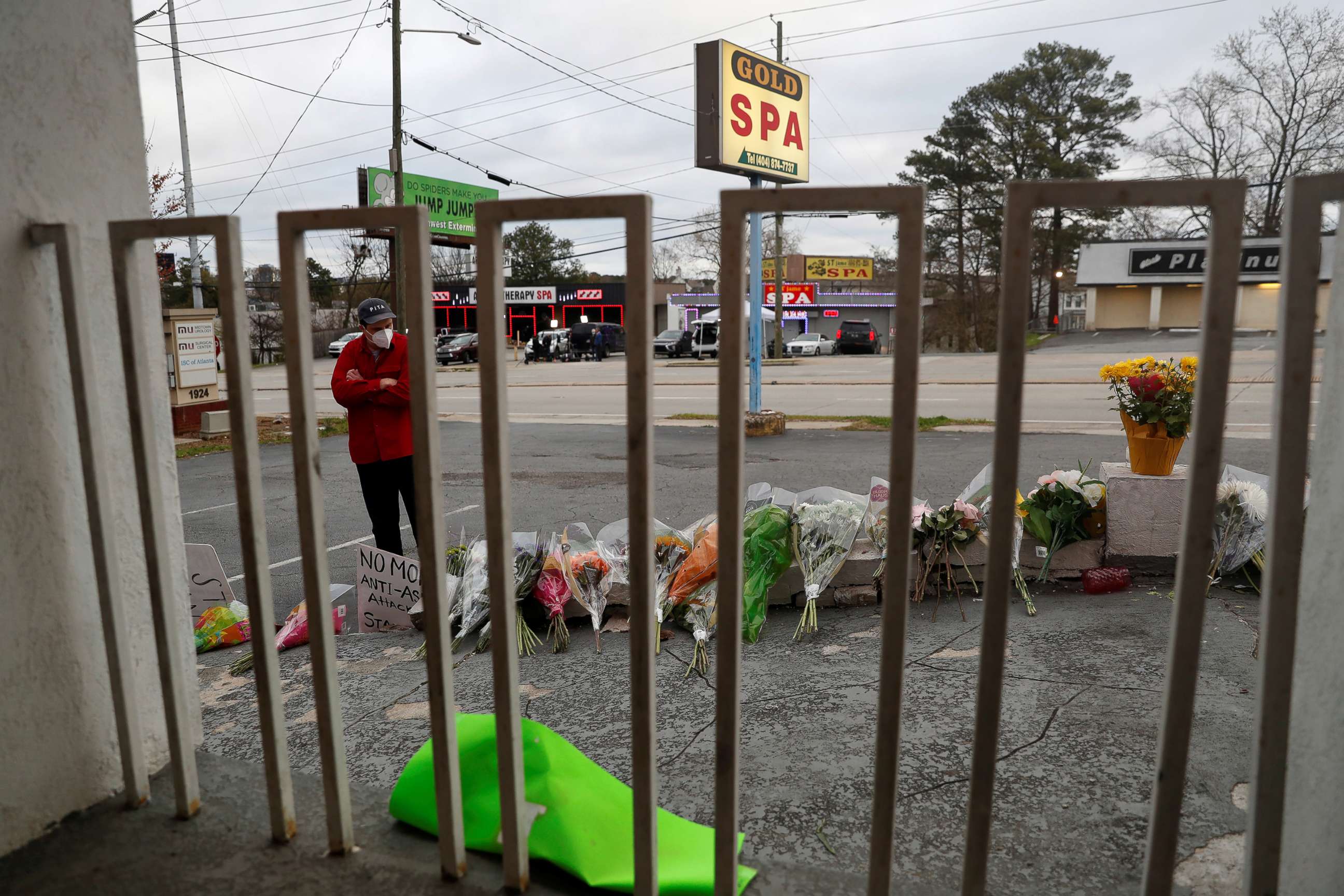Atlanta shooting and the legacy of misogyny and racism against Asian women
Advocates are calling for conversations to unravel harmful stereotypes.
While authorities are still investigating the motive behind Tuesday's shooting spree at three Atlanta-area spas that left eight people dead, including six Asian women, some advocates say the violence is inextricably linked to a history of racism and misogyny against Asian women.
Suspect Robert Aaron Long, 21, told investigators that he blames the businesses he targeted for providing an outlet for his addiction to sex, the Cherokee County Sheriff's office said, yet officials believe there were multiple motivators for the attack.
However, advocates who spoke with ABC News say attacks against Asian Americans, in particular, Asian American women, is rooted in an ugly side of American history.
"This is racially motivated sexual violence against women," Sung Yeon Choimorrow, executive director of the National Asian Pacific American Women's Forum, told ABC News.
"The reason they died wasn't just because they were women, even though that's what the killer says it is. They were murdered because they were Asian American women," Choimorrow said. "You cannot separate that."

The Asian women who lost their lives in the shooting were Daoyou Feng, 44; Xiaojie Tan, 49; Delaina Hyun Jung Grant, 51; Suncha Kim, 69; Soon Chung Park, 74; and Yong A. Yue, 63. Two other people, Paul Andre Michels, 54; and Ashley Yaun, 33; were also fatally shot.
Long has been charged with eight counts of murder in the attack, but has not been charged with a hate crime. Officials are still trying to piece together a motive.
Still, Choimorrow pointed to harmful stereotypes that objectify and depict Asian women as what she described as "hypersexualized," "meek" and "submissive."
"That really comes from America's long history of how they have categorized Asian American women as commodity," she said. "All the way back to 1875 with the Page Act, where they banned Chinese women from coming to the U.S. -- really because they didn't want the Chinese population to grow."
Legalized discrimination
The Page Act of 1875, "ostensibly barred the importation of women" from Asian countries, "for purposes of prostitution," according to language in a 2011 congressional bill expressing regret for passing discriminatory laws against Chinese immigrants in America.
The 2011 bill also referenced the Chinese Exclusion Act of 1882, which banned Chinese laborers from entering the United States and was the first federal law that excluded a single group of people on the basis of race, according to congressional documentation.
Discriminatory exclusion laws against Chinese immigrants were repealed in 1943, according to the Department of State Office of the Historian's website.
American imperialism and pop culture
Racism against Asian Americans continued despite the end of discriminatory legislation.
Some argue the United States' military presence in the Asia Pacific also played a role in stigmatizing Asians when American soldiers went abroad during World War II, the Korean War, the Vietnam War and the Philippine-American War.
And degrading depictions of Asian women are "pervasive" in pop culture, Dr. Melissa Borja, an assistant professor of Asian/Pacific Islander American studies at the University of Michigan, told ABC News.
"This depiction of Asian women as seductive, immoral, hypersexual ... is in our popular culture in movies like 'Full Metal Jacket' and the musical 'South Pacific'," Borja said.

She said the Atlanta shooting is part of a "long-standing trend of violence" against Asian American women this year and amid a spate of anti-Asian hate crimes fueled, in part, by the racist rhetoric surrounding the coronavirus pandemic.
Former President Donald Trump, had repeatedly referred to COVID-19 as the "China virus," among other offensive terms, during his presidency -- speech that helped stoke anti-Asian sentiment, some critics have said. Despite his comments, last March Trump condemned xenophobic attacks against Asians and tweeted: "It is very important that we totally protect our Asian American community in the United States...The spreading of the Virus is NOT their fault in any way, shape, or form."
The Stop AAPI Hate coalition received nearly 3,800 hate incidents from March 19 to Feb. 28 of this year.
Among those reports, 68% of the victims were women -- meaning women were targeted 2.3 times more than men.
Borja conducted research with the University of Michigan's Virulent Hate Project which analyzed more than 1,100 incidents of anti-Asian news media reports and found 61% of victims were Asian women.
"Asian American women were already dealing with the brunt of racist attacks in the past year, and they were already suffering," Borja said. "Asian American women are feeling the rage in this moment, in the fear that they now have about their own safety, their own ability to go to work, walk down the street, go get groceries, go about their daily lives."

Women of color in labor jobs, such as the victims who worked at the spa, are even more vulnerable because even amid the pandemic and rising hate incidents, they have to leave the safety of their homes to work.
Red Canary Song, a New York-based coalition of Asian advocates for massage parlor workers and sex workers, said Asians who work in these spaces are made "invisible" by gender and work.
"The women who were killed faced specific racialized gendered violence for being Asian women and massage workers ... they were subjected to sexualized violence stemming from the hatred of sex workers, Asian women, working class people, and immigrants," the group said in a statement.
Borja said the attack and today's data are just "the tip of the iceberg in the range of incidents of hate."

She said there's a lack of resources to document hate incidents against Asians, mistrust surrounding reporting incidents to law enforcement, a lack of cultural understanding around hate crimes, and language barriers. Stop AAPI Hate says it led the effort to improve data collection by allowing anyone across the nation to report anti-Asian hate incidents, without sharing it with law enforcement.
Advocates are calling for conversations to unravel harmful stereotypes, for more ways to safely report hate crimes against Asians, for schools to educate youth on the nation's Asian American history, and for legislation to address systemic issues at play.
For now the Asian American community is grieving the lives lost in the shooting with the hope for a better tomorrow.
"I want to tell all Asian women out there who are really struggling with thinking, 'I know this is not about me, it's about the eight victims,' know that it's okay to feel (for) both," Choimorrow said "It's okay to feel so scared because that feels so close to home."




